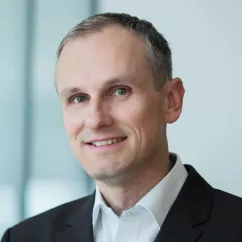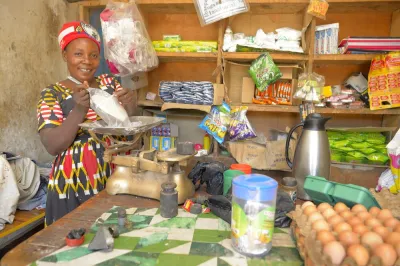Are Soft Skills Still Relevant As Microfinance Moves Into the Digital Age?

Peter Surek, Head of Social Banking at Erste Group, is a retail and social banker with 20 years of experience in Central and Eastern European markets. He started his career in Tatra banka, Slovakia going through almost all the positions in the retail branch network. While at Raiffeisen Bank International, he managed multiple strategic projects and co-founded a new direct bank. He joined Erste Group as Head of the new Retail MIS unit. After getting to know the social background of Erste, he decided to leave his retail career to develop social banking in the CEE countries, building a Europe-wide unique platform for financial inclusion.
FinDev Gateway: It looks like this year the EMN Annual Conference is shaking it up a bit! Instead of your usual two-day event with panels featuring speakers presenting on specific topics, the conference will take place in a single day and feature activities such as “world café,” “speed networking” and “cooperation tables.” Can you tell us about the concept behind this year’s conference?
Peter Surek: Yes, it will intentionally be a different type of conference. Our aim: a balanced mix of sky’s-the-limit inspiration and down-to-earth cooperation. The EMN board took a bold decision to innovate the format: skip panel discussions and instead foster inspiration by inviting exceptional speakers from outside of the sector to bring new perspectives. I am excited about the speakers’ unique blend of professional and personal backgrounds and experience. They include a charismatic orchestra conductor, one of the most visionary bankers, an exceptional IT entrepreneur and a microfinance-rooted impact investor. I am convinced they will help us think outside the box and inspire and invigorate all conference participants.
The other main change is the strong focus on fostering collaboration within the sector by using different networking and cooperation formats. We have so much potential within the network, not only in terms of sharing know-how and experience, but also in doing things, implementing projects together. We will ask the participants before the conference what collaboration topics are relevant for them. With the help of skillful facilitators, we aim to plant seeds within the conference which will grow to successful joint projects among the different institutions.
Our aim: a balanced mix of sky’s-the-limit inspiration and down-to-earth cooperation.
FinDev: The conference description argues: “Financial technology and artificial intelligence are developing and becoming more affordable at high speed, and we need to be ready for it to avoid any disruption to our current business models and processes.” Is microfinance threatened by technology? How could the sector turn this reality into an opportunity?
Peter: It’s difficult to give a holistic answer to that in a few sentences. I believe almost every industry can be disrupted by new technology, but the ultimate disrupting factor is not the technology itself, but rather customers' changed expectations regarding quality, speed and convenience -- in other words, “customer experience.” The technological leaders are also defining new pricing expectations, meaning that MFIs with high operational costs will hardly be able to stay competitive.
The challenge: providing great customer experience and high operational efficiency demands significant investments that are unaffordable for many microfinance players. This is a clear space for collaboration between institutions in different markets to form alliances and together pursue digital innovation despite all the complexity that may come from joint development.
On the other hand, we see that the technology is also creating new exclusions, such as people who are not capable of using digital channels, clients who stand to be rejected by artificial intelligence (AI) algorithms due to their poorer social media or internet history scoring, etc. That’s one reason I am confident that we will still have plenty of work to do in the area of financial inclusion in the upcoming years.
FinDev: On the program, there is a series of “Soft Skills Workshops” on Leadership in Networks and Design Thinking. How relevant are soft skills nowadays, as the microfinance sector moves into the digital age?
Peter: In a constantly changing world in which many hard skills are being overtaken by advancing technology, soft skills are the critical differentiating factor for future success. Even more so for leaders who are at the forefront of facing the unpredictability, ambiguity and general insecurity of the current times, and who still aim to pursue a clear vision within their organizations and create supportive and collaborative internal and external environments. That is a real challenge and we are aware that many microfinance leaders simply cannot find time for personal development in their daily operational routine.
That’s why the conference will offer high-quality workshops on two relevant topics. Providing leadership in a network without clear hierarchies, pre-defined roles and responsibilities, and being able to build on facilitation and the engagement of different stakeholders, are core skills for the 21st century -- all the more so for relatively small microfinance institutions, whose very existence depends on support networks.
I believe the design thinking workshop can be an innovation trigger for participants, because it changes the usual approach to problem-solving in which we tend to start with a solution rather than a deep understanding of problem.
In a constantly changing world in which many hard skills are being overtaken by advancing technology, soft skills are the critical differentiating factor for future success.
FinDev: The conference aims to provide space for participants to grow and develop personal skills to boost their ability to inspire staff. What do you think are the top human resources challenges going forward for the microfinance industry?
Peter: I can talk with confidence about the region of Central and Eastern Europe, where we are present and know the situation first-hand. In this region, we are facing very tight job markets as a result of strong economic growth, better-paid job offers in private (but also the public sector) and the dramatic brain drain occurring from Eastern to Western Europe. There is no simple recipe for mastering this big challenge.
On the recruitment side, MFIs need to either become attractive for the new professionals entering the job markets and provide far more advanced induction and development programs - or they should seek their niche among older employees who are looking for more purpose and meaning in their professional lives. At the same time, MFI managers’ motivation, engagement and leadership skills are key for retaining good people and that is why the conferences aims to deliver for them an energizing boost of inspiration, joint learning and the useful exchange of experiences.
FinDev: You are a member of the EMN Board, but also Head of Social Banking at Erste Group. What does it mean for your organization to co-organize and host this conference?
Peter: We are very honored by the opportunity to co-organize the EMN conference in such a prominent year in Erste Group's history – namely, the 200th anniversary of our founding (we’re likely to be the oldest participant at the conference!). For us at Erste, 2019 is a year in which we are more conscious than ever about our roots as the first Austrian bank to open its doors to ordinary people. We are keenly aware that our founding purpose is to foster prosperity for all. And we are greatly looking forward to participating in – and hopefully seeing many of you – at the EMN Conference in Vienna in June!


